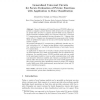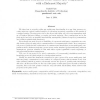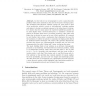25 search results - page 4 / 5 » Bounded-Concurrent Secure Two-Party Computation in a Constan... |
ICISC
2008
13 years 7 months ago
2008
Secure Evaluation of Private Functions (PF-SFE) allows two parties to compute a private function which is known by one party only on private data of both. It is known that PF-SFE c...
EUROCRYPT
2004
Springer
13 years 11 months ago
2004
Springer
We revisit the following open problem in information-theoretic cryptography: Does the communication complexity of unconditionally secure computation depend on the computational com...
STOC
2004
ACM
14 years 6 months ago
2004
ACM
We show how to securely realize any multi-party functionality in a way that preserves security under an a-priori bounded number of concurrent executions, regardless of the number ...
CRYPTO
2009
Springer
14 years 6 days ago
2009
Springer
The problem of carrying out cryptographic computations when the participating parties are rational in a game-theoretic sense has recently gained much attention. One problem that h...
CRYPTO
2000
Springer
13 years 10 months ago
2000
Springer
In this work we use cryptography to solve a game-theoretic problem which arises naturally in the area of two party strategic games. The standard game-theoretic solution concept for...



